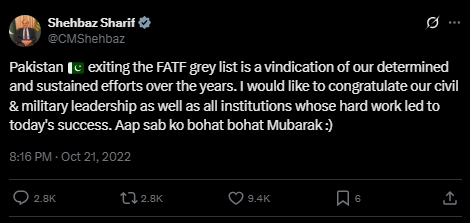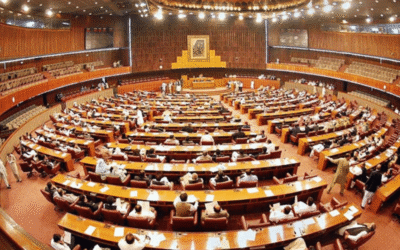Pakistan was added to the list of the Financial Action Task Force (FATF) in 2018. This “grey listing was due to shortcomings in its anti-money-laundering and counter terrorist financing (AML/CFT) regime. Pakistan was subjected to increased scrutiny, especially regarding financial transactions, and was at risk of facing more sanctions. The government launched several reforms to remove itself from the list. An action plan was introduced to address legal and regulatory gaps. In 2022, the FATF itself recognized Pakistan’s efforts, stating, “addressed technical deficiencies to meet the commitments of its action plans”. In October of the same year, the country was finally removed from the grey list.
Strengthening the AML/CFT Framework
Pakistan needed a comprehensive re-evaluation of its reforms after the FATF’s verdict. Weaknesses were identified in the AML/CFT framework, including inadequate risk assessment, insufficient legal oversight, and gaps in mutual legal assistance. To address these issues, a dedicated National FATF secretariat was established to facilitate liaison among seven ministries, 50 agencies, and international partners. Furthermore, low enforcement agencies and regulators ensured that the new reforms were being implemented.
Laws were also strengthened; for example, a new Mutual Legal Assistance Act was implemented to speed up cross-border investigations. In 2020, the government also issued AML/CFT sanction rules. The amended AML plan saw Pakistan’s accountancy institutions (ICAP/ICMAP) designated as AML/CFT regulators. This strict compliance required banks and numerous non-bank businesses to adhere to, contributing to the fulfillment of FATF recommendations.
The scale of monitoring and enforcement was expanded. Inter-agency cooperation was strengthened under the Financial Monitoring Unit (FMU), and banks were required to apply risk-based due diligence. FATF took note of these developments. The arrest of a high-profile militant leader in spring 2022 also further aided Pakistan’s move to get off the grey list, as it complied with FATF’s demands. Due to these intensive efforts, FATF acknowledged that the country was “compliant or largely compliant”. The action plan was finally completed in June 2022, and Pakistan was subsequently removed from the list.
Monitoring Charities and Madrassas
Stricter regulation of non-profit organisations was a strategic component of Pakistan’s compliance strategy. The new charity sector reforms ensured that NGOs were not using funds for illegal personal purposes. Charities that were inactive or refused to comply with federal and provincial authorities were reregistered by 2019. For instance, according to one analysis, the registrations of more than 9,000 NGOs were revoked in Punjab, 7,000 in Sindh, and 4,000 in Khyber Pakhtunkhwa, respectively. This was often a result of the NGO’s attempt to conceal audited financial statements or the sources of its funds. Pakistan’s tax regulatory institutions increased their audits for non-profit accounts. This was usually due to the NGOs’ failure to disclose audited financial statements or funding sources. Even investigations into the finances of some well-known NGOs were launched by the National Accountability Bureau, which, when required, forwarded cases to interior authorities.
Clear guidelines were provided to NGOs on deregistration. A bill was passed in 2022 to comply with the FATF requirement, establishing a consistent system for registering and regulating charities nationwide. Reforms were also adopted at the provincial level. KPK introduced its charity commission under the 2019 Act, and Punjab made registration with a charity commission compulsory. Initially created in 1992 to support NGOs, the Federal Trust for Voluntary Organisations (TVO) was revived in 2019 to support the coordination of NGOs with national development goals.
Due to these initiatives, Pakistan’s NGOs and charities have become more transparent. There was a greater insistence on legitimacy and accountability. A report highlighted that NGOs themselves have begun to demand accessible district-level registration and uniform audits, acknowledging that a clear framework can protect civic organizations from unnecessary scrutiny. The FATF pressure helped to mainstream the charity sector instead of stifling it.
Exit from the Grey List
Pakistan was finally rewarded for its years of effort in October 2022. In Paris, the FATF President T. Raja Kumar announced that Pakistan has been removed from the grey list, adding that “Pakistan had addressed technical deficiencies to meet the commitments of its action plans.” A successful on-site delegation preceded this decision. Prime Minister Shehbaz Sharif also welcomed this news and shared on X that the exit “is a vindication of our determined and sustained efforts over the years”. He lauded the civil and military structures for making this possible. The news was celebrated both nationally and internationally, and economists noted that the removal from the grey list should lower transaction costs and attract more investments; however, it is necessary to stick to the reforms to maintain stable progress.

Source: X/@CMShehbaz
Pakistan has also leveraged this success internationally. In 2022, Foreign Minister Bilawal Bhutto urged the EU to follow up on the FATF decision with Pakistan’s removal from the EU’s AML/CFT watch-list. The exit from the grey list is beneficial for Pakistan’s credibility. It has opened the door to talks on restoring preferential trade and investment regimes, highlighting its improved anti-terror financing credentials.
The removal from the FATF’s grey list was a significant turning point in Pakistan’s pursuit of international recognition and the restoration of its financial integrity. The country demonstrated its commitment to good governance through extensive reforms, institutional coordination, and regulation of sensitive sectors, including NGOs and madrassas. To maintain this hard-won success in the future, ongoing compliance and international cooperation will be crucial.







